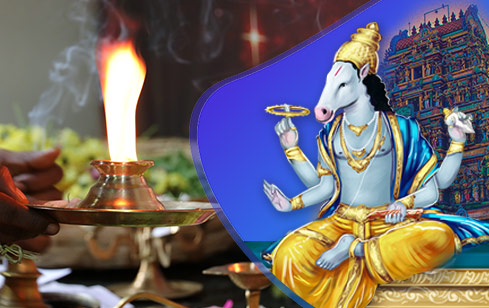The Hayagriva temple at Thirvanthipuram is one of the Indian temples that is dedicated to Lord Hayagriva. This temple is exactly at a distance of 7 km from the district of Cuddalore, Tamil Nadu. The Hayagriva temple is famously referred to as Devanatha Swamy temple and is one of the 108 Divya Desams (Sacred shrines) that are specifically devoted to Lord Perumal or Lord Vishnu. The main deity of this temple is Mahavishnu, who is widely regarded as Devanatha Swamy. Along with Mahavishnu, the temple also idolizes Goddess Lakshmi, who is locally acknowledged as Sengamala Valli Thayar. The idol of Lord Hayagriva is worshipped here and holds a solitary meditation or yoga posture.
Hayagriva Jayanthi will be celebrated on August 11, 2022. The temple would eventually conduct multiple divine ceremonies to celebrate Hayagriva Jayanthi this year.
The main Deities of this Temple
The main deity of this temple is Lord Vishnu. This temple is famous for housing idols of Lord Perumal in 3 different positions. Firstly, the temple has an idol of Devanatha Swamy in Nindra Thirukolam or standing posture. Secondly, there is also an idol for Lord Vishnu in a reclining posture. Lastly, there is also an idol for Lord Ahindrapuranatha in sitting posture. The other deities of this temple include Lord Rama, Sri Venugopalan, 12 Alwars, Aandaal Thayaar, Sree Rajagopalan, Desika, and Sree Chakarathalwar. The temple is likely to have scheduled numerous religious celebrations for Hayagriva Swamy on the Hayagriva Jayanthi of this year.
The Significance of this Temple
The architectural style of the temple is Dravidian. It is exactly situated amongst several Aswatha trees of the Oushadhagiri Hill of Cuddalore. The plants and herbs that encompass this temple have high medicinal values. The temple is also located alongside River Gadilam. This river is religiously referred to as Garuda Nadhi. The water of this river is believed to turn bright red during every monsoon as a result of the suffering the aftermath of the curse of a Rishi.
Acharya Vedanta Desikan, a Hindu devotee, is believed to have performed a mega penance around this temple. At the end of the penance, the devotee was blessed and graced with the darshan of Lord Garuda and Lord Hayagriva. This temple is also mentioned in the famous Tamil Literary work, 4000 Divya Prabhandham, written by the 12 Alwars. It is also believed that Sri Ramanujacharya, one of the most respected philosophers of the Tamil society, resided at Thiruvanthipuram for a significant period. The temple organizes 6 poojas every day. All rituals performed in this temple are said to be executed according to the principles of the Vaishnava tradition. The temple commemorates various special festivals, including Vaikunta Ekadesi, Rama Navami, and Hayagriva Jayanthi. A large number of pilgrims and tourists visit this temple at all times of the year.
A Briefing on Hayagriva Jayanthi
Lord Hayagriva is seen as a head of a horse and the body of a human being. The birth anniversary of Lord Hayagriva is celebrated as Hayagriva Jayanthi every year. Lord Hayagriva is one of the 10 incarnations of Lord Mahavishnu. Several Brahmins refer to Hayagriva Jayanthi as Upakarma. Hayagriva Jayanthi usually falls on a full moon day of the Tamil month Shravan. Avani Avittam, a special Tamil occasion, is also celebrated during Hayagriva Jayanthi every year. Lord Hayagriva is worshipped as a symbol of wisdom and learning. Thus, visiting any Hayagriva temple on Hayagriva Jayanthi can help achieve greater heights in life.
Hayagriva Jayanthi celebrations of this temple
The temple puts in increased efforts to celebrate Hayagriva Jayanthi on a grand scale every year. This year, the temple is expected to have organized various poojas and special religious rituals on Hayagriva Jayanthi. The Hayagriva idol of this temple would steal a major focus on every Hayagriva Jayanthi. This idol portrays Goddess Mahalakshmi seated on the right lap of her son Lord Hayagriva. But other Hayagriva idols in India have Goddess Mahalakshmi on the left lap of Lord Hayagriva. Additionally, this temple is believed to be the temple that was the first to house an idol for Lord Hayagriva in India. Therefore, the people, who work at this temple, come up with multiple poojas to worship its one-of-a-kind Hayagriva idol on Hayagriva Jayanthi every year.


